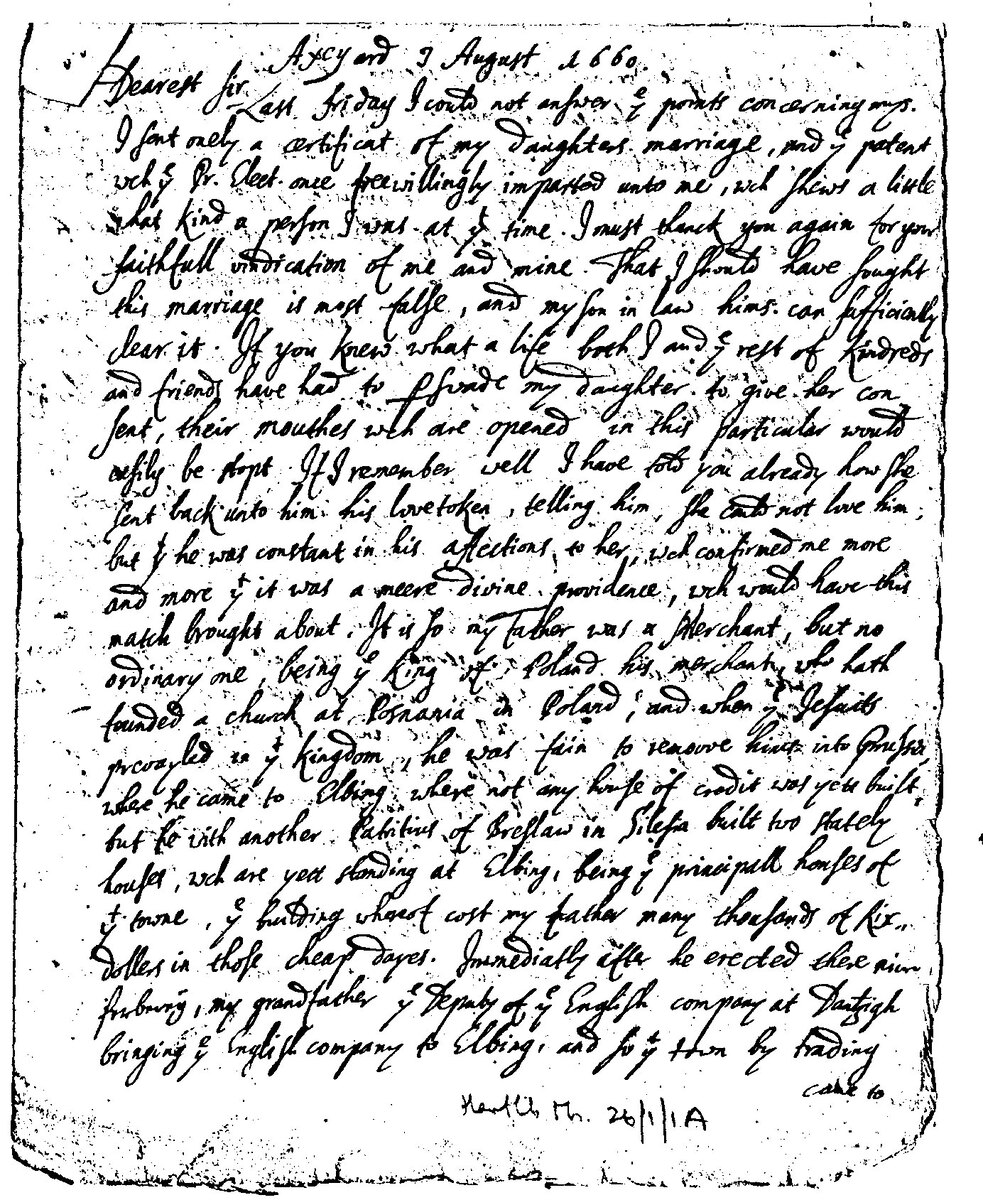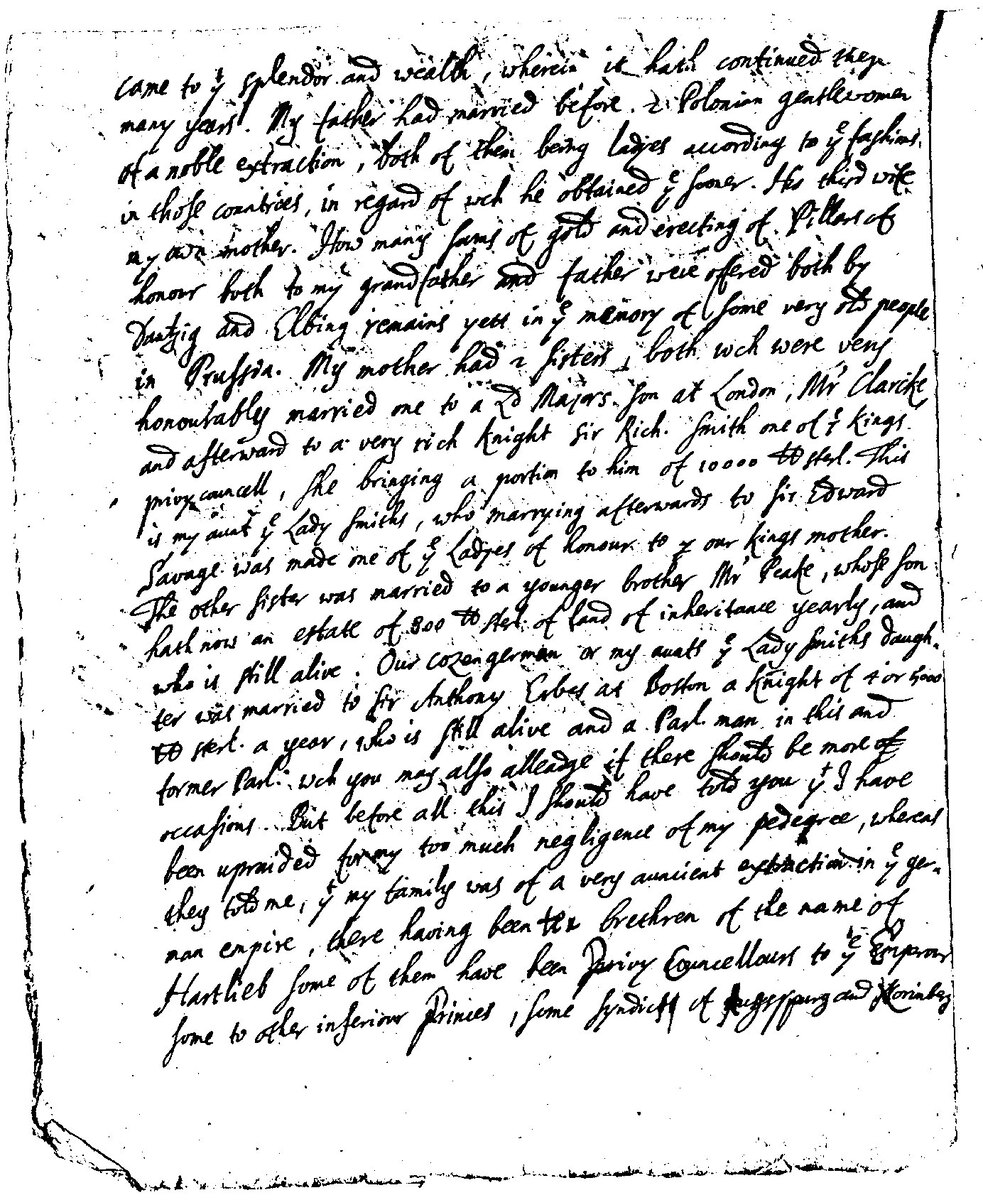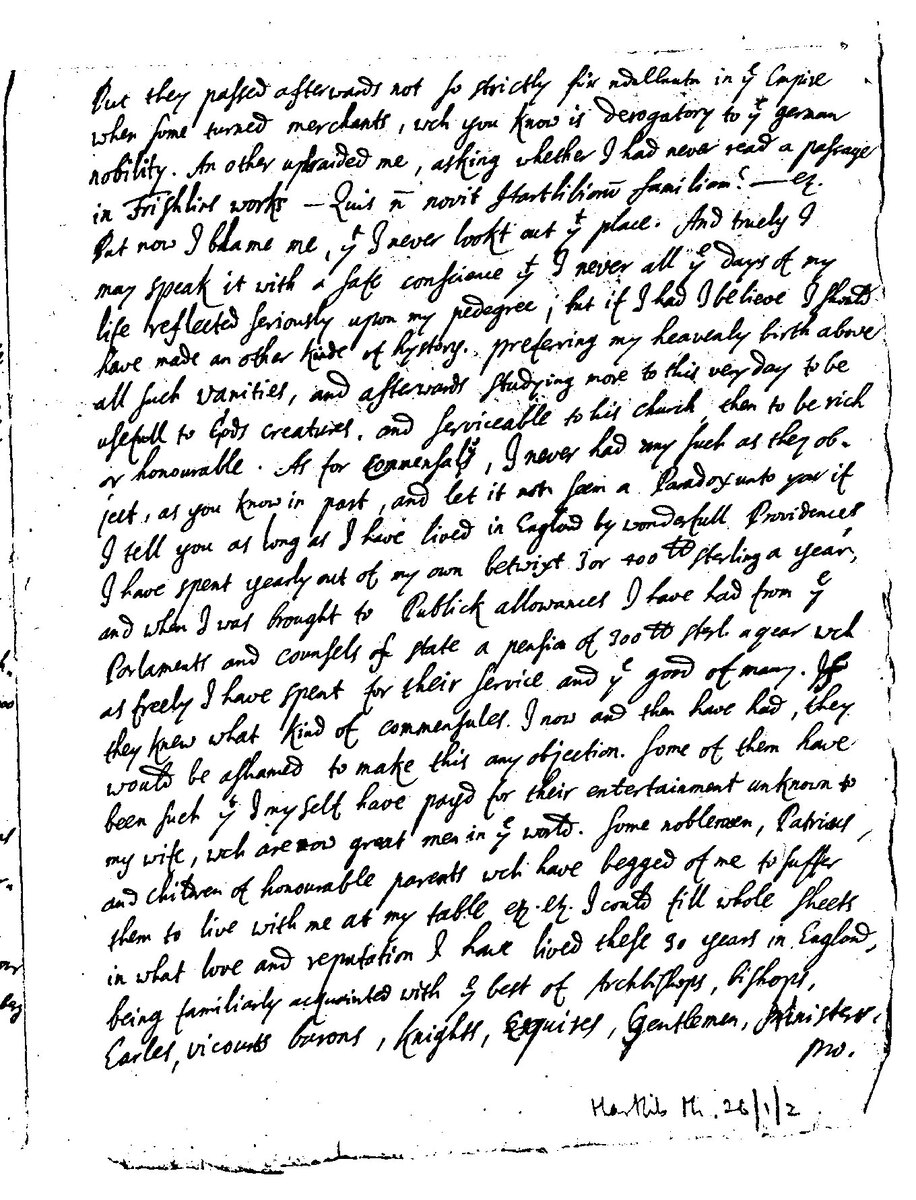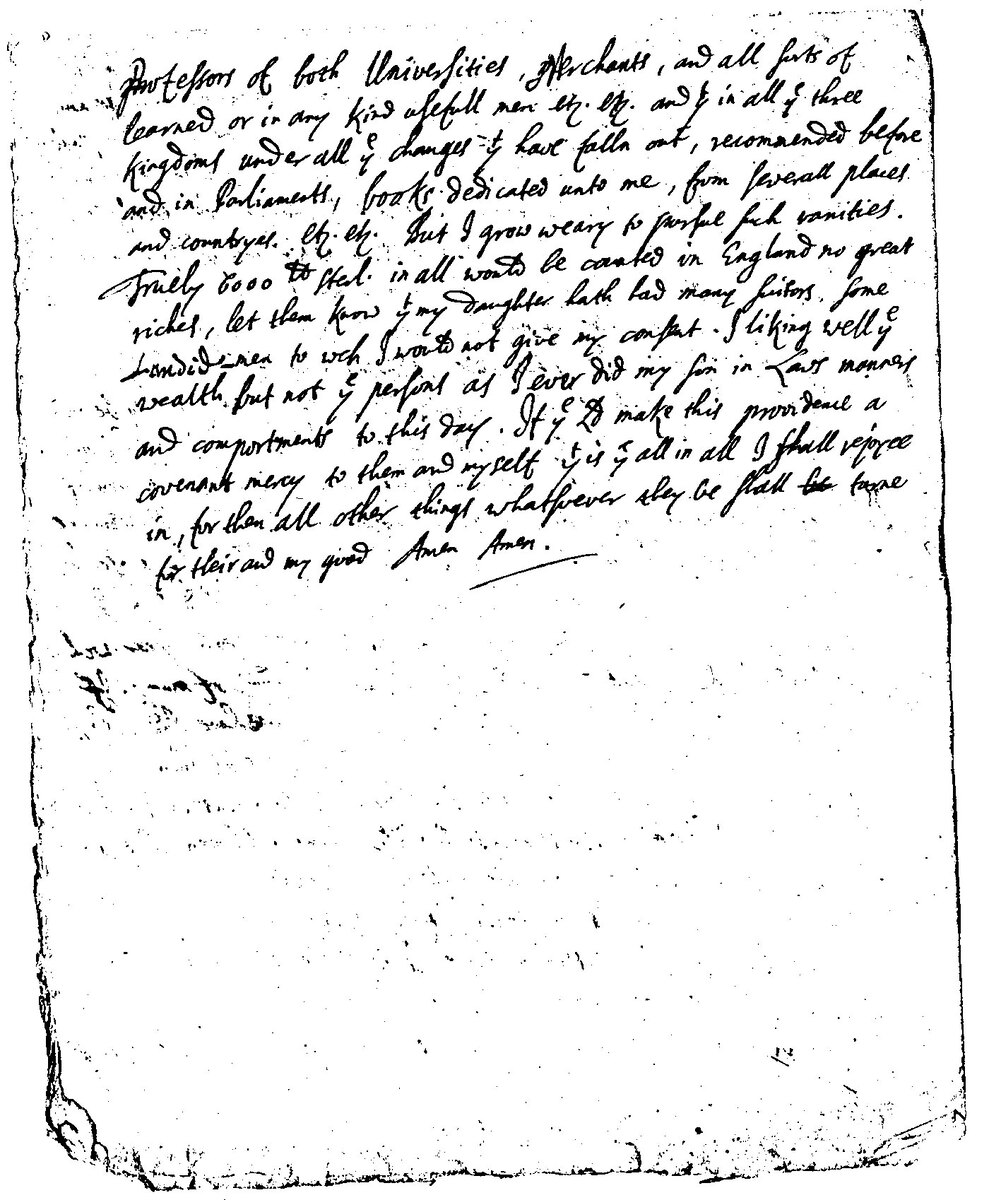Marriage among European Elites: Samuel Hartlib to John Worthington (1660)
Abstract
Samuel Hartlib (c. 1600–1662), a Prussian-born polymath who settled in England after attending the University of Cambridge, maintained an extensive correspondence network. In this letter to the English academic John Worthington (1618–1671), Hartlib describes his own family history, including his father’s multiple marriages. He wrote this letter in response to rumors that he had married his daughter Anna to the wealthy merchant Johannes Roder of Utrecht in order to benefit from his wealth, since his daughter herself brought no dowry into the marriage.
Being German comes up both when he discusses marriage and when he describes how mercantile activity is considered detrimental to social status in the eyes of the German nobility.
Source
Axeyard 3 August 1660.
Dearest sir,
Last friday I could not answer the points concerning myself. I sent onely a certificat of my daughters marriage, and the patent which the Prince Elector once free willingly imparted unto me, which shews a little what kind a person I was at that time. I must thanck you again for your faithfull vindication of me and mine. That I should have sought this marriage is most false, and my son in law himself can sufficiently clear it. If you knew what a life both I and the rest of kindreds and friends have had to persvade my daughter to give her consent, their mouthes which are opened in this particular would easily be stopt. If I remember well I have told you already how she sent back his love token, telling him, she could not love him; but that he was constant in his affections to her, which confirmed me more and more that it was a meere divine providence, which would have this match brought about. It is so my Father was a Merchant, but no ordinary one, being the king of Poland his merchant, who hath founded a church at Posnania in Poland, and when the Jesuits prevayled in that kingdom, he was fain to remove himself into Prussia, where he came to Elbing, where not any house of credit was yett built, but he with another Patritius of Breslaw in Silesia built two stately houses, which are yett standing at Elbing, being the principall houses of that towne, the building whereof cost my father many thousands of Rixdollers in those cheap dayes. Immediatly after he erected there eine ferberey, my grandfather the Deputy of the English company at Dantzigh bringing the English company to Elbing, and so that town by trading [catchword: came to] came to that splendor and wealth, wherein it hath continued these many years. My father had married before .2 Polonian gentlewomen of a noble extraction, both of them being ladyes according to the fashions in those countries, in regard of which he obtained the sooner. His third wife my own mother. How many sums of gold and erecting of Pillars of honour both to my grandfather and father were offered both by Dantzig and Elbing remains yett in the memory of some very old people in Prussia. My mother had 2 sisters, both which were very honourably married one to a Lord Majors son at London, Mr Clarcke, and afterward to a very rich knight sir Richard smith one of the kings privy councell, she bringing a portion to him of 10000lb sterling. This is my aunt the Lady smiths, who marrying afterwards to sir Edward Savage was made one of the Ladyes of honour to [letter deleted] our kings mother. The other sister was married to a younger brother Mr Peake, whose son hath now an estate of 300lb sterling of land of inheritance yearly, and who is still alive. Our cozen german or my aunts the Lady smiths daughter was married to sir Anthony Erbes at Boston a knight of 4 or 5000lb sterling a year, who is still alive and a Parliament man in this and former Parliament is which you may also alledge if there should be more of occasions. But before all this I should have told you that I have been upraided for my too much negligence of my pedegree, whereas they told me, that my family was of a very auncient extraction in the german empire, there having been [H: ten] brethren of the name of Hartlieb some of them have been Privy [H capitalises] Councellors [H capitalises] to the Emperour [H capitalises] some to other inferiour Princes [H capitalises], some [syndics? altered] of Augspurg [H capitalises] and Norimberg [H capitalises] But they passed afterwards not so strictly für edelleute in the Empire when some turned merchants, which you know is derogatory to the german nobility. An other upbraided me, asking whether I had never read a passage in Frishlins works - Quis non novit Hartlibiorum familiam? - etc. But now I blame me, that I never lookt out that place. And truely I may speak it with a safe conscience that I never all the days of my life reflected seriously upon my pedegree; but if I had I believe I should have made an other kinde of hystory. preferring my heavenly birth above all such vanities, and afterwards studying more to this very day to be usefull to Gods creatures, and serviceable to his church, then to be rich or honourable. As for Commensales [H capitalises & alters], I never had any such as they object, as you know in part, and let it not seem a Paradox unto you if I tell you as long as I have lived in England by wonderfull Providences, I have spent yearly out of my own betwixt 3 or 400lb sterling a year, and when I was brought to Publick allowances I have had from the Parlaments and counsels of state a pension of 300lb sterling a year which as freely I have spent for their service and the good of many. If they knew what kind of commensales I now and then have had, they would be ashamed to make this any objection. some of them have been such that I myself have payd for their entertainment unknown to my wife, which are now great men in the world. some noblemen, Patrons, and children of honourable parents which have begged of me to suffer them to live with me at my table etc. etc. I could fill whole sheets in what love and reputation I have lived these 30 years in England, being familiarly acquainted with the best of Archbishops, bishops, Earles, vicounts barons, knights, Esquires [altered], Gentlemen [H capitalises], Ministers [H capitalises], [catchword: pro.] Professors [H capitalises] of both Universities, Merchants [H capitalises], and all sorts of learned or in any kind usefull men etc. etc. and that in all the three kingdoms under all the changes that have falln out, recommended before and in Parliaments, books dedicated unto me, from severall places and countryes. etc. etc. But I grow weary to pursue such vanities. Truely 6000lb sterling in all would be counted in England no great riches, let them know that my daughter hath had many suitors, some [H: Landed-] men to which I would not give my consent. I liking well the wealth but not the persons as I ever did my son in Laws manners and comportments to this day. If the Lord make this providence a covenant mercy to them and myself that is the all in all I shall rejoyce in, for then all other things whatsoever they be shall be turne for their and my good Amen Amen./
Source: Samuel Hartlib to John Worthington, August 3, 1660, 26/1/1A-2B (https://www.dhi.ac.uk/hartlib/view?docset=main&docname=26A_01) in Greengrass, M., Leslie, M. and Hannon, M. (2013), The Hartlib Papers. Published by The Digital Humanities Institute, University of Sheffield. Available online at: https://www.dhi.ac.uk/hartlib



